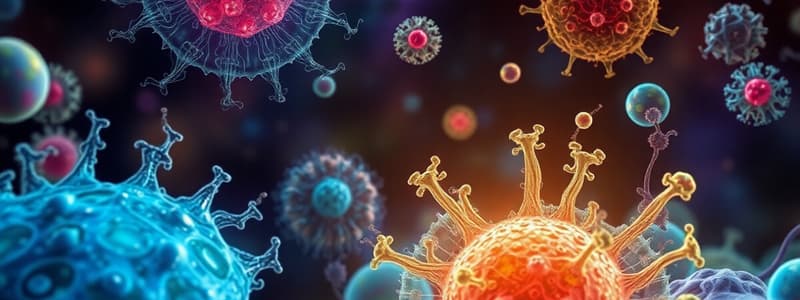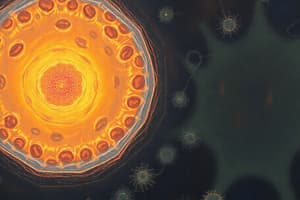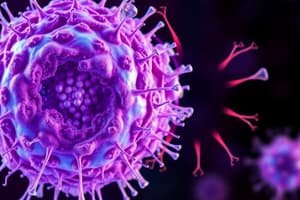Podcast
Questions and Answers
What defines an organism as living?
What defines an organism as living?
Which of the following describes unicellular organisms?
Which of the following describes unicellular organisms?
Who was the first to observe and describe a live cell?
Who was the first to observe and describe a live cell?
What significant discovery did Robert Brown make?
What significant discovery did Robert Brown make?
Signup and view all the answers
What contribution did Matthias Schleiden make to cell theory?
What contribution did Matthias Schleiden make to cell theory?
Signup and view all the answers
What is the fundamental role of a cell in living organisms?
What is the fundamental role of a cell in living organisms?
Signup and view all the answers
What advancement helped reveal the structural details of cells?
What advancement helped reveal the structural details of cells?
Signup and view all the answers
Study Notes
Overview of Cells
- Cells are the fundamental units that define all living organisms.
- Organisms can be classified as unicellular (single-cell) or multicellular (multiple cells).
- Unicellular organisms perform all essential life functions independently.
Structure and Discovery of Cells
- Anton Von Leeuwenhoek was the first to observe and describe live cells.
- Robert Brown discovered the nucleus, a critical component of cells.
- The invention of the microscope, especially the electron microscope, allowed detailed structural analysis of cells.
Cell Theory
- Matthias Schleiden, in 1838, concluded that all plants are made up of different kinds of cells, forming plant tissues.
- Theodore Schwann, in parallel with Schleiden's findings, extended this observation to animal tissues, contributing to the formulation of cell theory.
- Cell theory asserts that all living organisms are composed of cells, which are the basic units of life.
Studying That Suits You
Use AI to generate personalized quizzes and flashcards to suit your learning preferences.
Description
Explore the fundamental concepts of biology related to cells in this quiz from Chapter 8. Discover the differences between prokaryotic and eukaryotic cells, as well as the significance of unicellular and multicellular organisms. Test your knowledge on what defines life at the cellular level.




